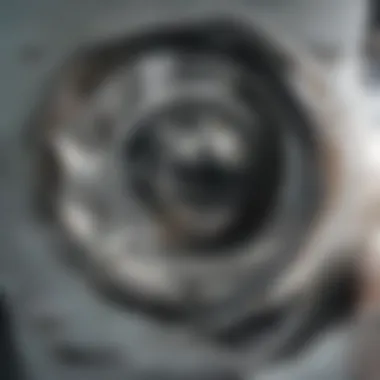Effective Cleaning Solutions for Washing Machines


Intro
Washing machines are essential appliances in modern homes. They work tirelessly to clean our clothes, yet they often go unnoticed until they start to show signs of neglect. A clean washing machine not only ensures efficiency but also extends the lifespan of the appliance. Regular maintenance can prevent common problems like mold, odors, and poor cleaning performance.
Feature Spotlight
Exceptional Cleaning Solutions
Cleaning a washing machine doesn’t require complicated processes. There are effective cleaning methods that can be easily integrated into your routine. A popular homemade solution involves using vinegar and baking soda.
- Vinegar: This natural ingredient acts as a disinfectant and helps break down mineral deposits and soap scum.
- Baking Soda: It helps neutralize odors while providing a gentle abrasive action that can remove grime.
To use these, simply add two cups of vinegar to the drum and run a hot cycle. Follow with a half-cup of baking soda in the drum to enhance the cleaning effect.
Some users may prefer commercial cleaning products. Brands like Affresh and Tide offer tablets specifically designed to clean washing machines. These products can eliminate mildew and hard water stains effectively.
"Routine cleaning of your washing machine should be part of your monthly maintenance schedule to avoid unexpected issues."
Unique Maintenance Tips
Besides the cleaning solutions, certain practices can help maintain the washing machine.
- Leave the Door Open: After each load, leave the washing machine door slightly open. This helps in air circulation and prevents mold growth.
- Clean the Detergent Drawer: Remove and wash the detergent drawer regularly to prevent buildup of detergent residue.
- Check the Filter: Many washing machines come with a filter to catch lint and debris. Regularly check and clean this to ensure optimal drainage.
Common Issues from Neglect
Neglecting your washing machine can lead to several problems.
- Mold and Mildew: This often occurs in seals and gaskets. It gives off unpleasant odors and can transfer to your laundry.
- Reduced Efficiency: A dirty machine will not clean clothes effectively, leading to the need for more cycles and more detergent.
- Damaged Components: Clogs and blockages can lead to bigger issues, such as leaks or motor failure.
Summary
Understanding how to clean and maintain your washing machine is crucial for ensuring its longevity and effectiveness. Both homemade solutions like vinegar and baking soda, as well as commercial products, can be utilized effectively. Additionally, adhearing to maintenance tips can prevent common problems that arise from neglect. By following these guidelines, you can enhance the efficiency of your washing machine and extend its lifespan.
Prologue to Washing Machine Maintenance
Washing machines are essential appliances in many households. Their primary function is to make laundry more convenient and efficient. However, just like any other appliance, washing machines require regular maintenance to operate optimally. This section aims to highlight the significance of maintaining your washing machine and the impact it can have on its efficiency and lifespan.
Understanding the Importance of Cleaning
Cleaning a washing machine continuously helps prevent the build-up of dirt, detergent residues, and mineral deposits. This build-up can lead to odors and mildew, both of which can severely affect the appliance's efficiency. Regular cleaning ensures that all components, including hoses, drums, and filters, remain free from blockages that could hinder performance.
Keeping the washing machine clean also enhances its functionality. A clean machine is more effective at washing clothes, leading to better results and less wear on the fabrics. This means that clean water can circulate freely, and detergent can dissolve properly, allowing for a more effective cleaning action. A well-maintained washing machine can also reduce energy consumption, resulting in cost savings over time.
Consequences of Neglecting Cleaning
Neglecting to clean a washing machine can have several detrimental effects. Over time, residues and bacteria accumulate, which can produce unpleasant odors that linger on washed clothes. Mold and mildew can thrive in moist environments, creating health risks for users.
Moreover, continued neglect can lead to mechanical problems. For example, clogged filters can cause the washing machine to work harder, which may lead to increased wear on the motor and components. As this happens, the energy efficiency of the appliance diminishes, leading to higher utility bills.
In some extreme cases, neglect can even cause irreversible damage, requiring costly repairs or total replacement of the machine. The preventative actions taken through regular cleaning can save both time and money in the long run. All these factors underscore the importance of integrating cleaning into regular washing machine maintenance routines.
Collection of Cleaning Agents
The cleaning agents you choose for your washing machine are crucial to maintaining its performance and longevity. A well-maintained washing machine ensures that your laundry gets cleaned effectively and minimizes wear and tear. The right cleaning solutions help to remove buildup of detergent residue, fabric softener, and other contaminants. Understanding the benefits and considerations of various cleaning agents can empower you to make informed decisions during your maintenance routines.
Commercial Cleaning Products


Commercial cleaning products are specifically designed for washing machines. These products come in various formulations and often target common issues that arise in these appliances.
Specialized washing machine cleaners
Specialized washing machine cleaners are formulated to address the unique challenges faced by these appliances. They typically contain ingredients that break down residues and enhance cleaning efficiency. The key characteristic of these cleaners is their targeted action; they are designed to eliminate mildew, odors, and buildup that regular detergents may miss. This makes them a popular choice for users who want thorough cleaning between regular maintenance cycles.
One unique feature of specialized cleaners is their ease of use—many come in convenient single-use packets. This means there is no need for measuring or guesswork, which can potentialy lead to improper amounts being used. However, while these cleaners are effective, they can be more expensive than other cleaning options, and some users may prefer to save money with homemade alternatives.
Liquid vs. powder cleaners
When it comes to commercial cleaning solutions, both liquid and powder cleaners have their own merits. Liquid cleaners are often easier to measure and dissolve quickly in water, making them ideal for instant use. In contrast, powder cleaners have a longer shelf life and can be more cost-effective, especially for regular use.
The flexibility of liquid cleaners enables them to be added directly to the wash cycle with little fuss. However, powder cleaners may leave residue if used improperly. When selecting between these options, consider your washing habits and preferences to determine which form aligns best with your needs.
Homemade Cleaning Solutions
Many people prefer homemade cleaning solutions due to their cost-effectiveness and the use of natural ingredients. These solutions can often match the effectiveness of commercial options while being gentler on the environment and your washing machine.
Vinegar and baking soda
Vinegar and baking soda are a potent combination for cleaning washing machines. Vinegar acts as a natural disinfectant, eliminating odors and breaking down mineral deposits, while baking soda neutralizes odors and scrubs away stains. This combination makes it a strong contender for deep cleaning.
A mixed characteristic of vinegar and baking soda is their simplicity and accessibility. Most households already have these ingredients on hand, making it easy to incorporate them into regular cleaning routines. The unique feature of this solution is its dual action—cleaning and deodorizing simultaneously. However, while these ingredients are safe and effective, their power may not compare to specialized cleaners when dealing with severe buildup.
Lemon juice and water
Lemon juice and water create another effective homemade cleaning solution. Lemon juice has natural antibacterial properties and a pleasant scent that help freshen your washing machine. When diluted with water, it can be used regularly to prevent mildew and odors.
The main benefit of using lemon juice and water is its natural composition. This choice appeals to those who are cautious about using harsh chemicals in their home. The unique feature of this solution lies in its aromatic benefits, leaving your washing machine smelling fresh. However, against stubborn stains or hard mineral buildup, it may not provide the same level of cleaning power as commercial cleaners.
In summary, selecting the right cleaning agent is essential for washing machine maintenance, whether opting for commercial products or homemade solutions.
Understanding the characteristics and advantages of each option can guide you in making wise choices to keep your washing machine functioning efficiently.
Step-by-Step Cleaning Process
Cleaning your washing machine is not merely a chore. It is a fundamental aspect of maintaining your appliance that ensures its longevity and optimal performance. A systematic approach to cleaning maximizes efficiency and minimizes the risk of common issues such as odors, mold, and residue buildup.
Preparing the Washing Machine
Before you begin the cleaning process, it is essential to prepare your washing machine adequately. Start by unplugging the machine to ensure safety. Next, check the drum for any items left behind, such as coins or small clothing pieces. These can obstruct the cleaning process and potentially cause damage when the machine is in operation.
Cleaning around the exterior, including the knobs and control panel, is also necessary. Use a damp cloth with a mild detergent to wipe down surfaces. This initial step may seem simple, but it sets the foundation for effective cleaning.
Applying Cleaning Agents
Front-load machines
Front-load machines are known for their water efficiency and gentle cleaning action. However, their design can trap moisture, leading to growth of mold and mildew. Applying the right cleaning agents is imperative in this context. It is advisable to use a specialized washing machine cleaner or a combination of vinegar and baking soda. These agents help remove buildup effectively. Their key characteristic is their ability to penetrate stains and residues in the drum and door seals.
One must consider that front-load models require attention to door seals and dispensers, ensuring these areas are clean to avoid future odor issues. The unique feature of front-load machines is their horizontal drum, which may have less movement during the cycle than top-loaders. This can lead to detergent residue if not properly maintained. Hence, a proper application of cleaning agents is vital to ensuring smooth operation in the long-term.
Top-load machines
Top-load machines are often favored for their convenience and ease of use. They allow you to easily add clothes during the wash, which is a significant advantage for many users. When applying cleaning agents to top-load machines, it is important to use more substantial amounts due to their larger capacities. Many choose liquid cleaners, which dissolve easily in water, allowing for even distribution throughout the load.
The main advantage of top-load machines is their agitation process, which tends to do a better job at loosening dirt and debris within the drum. However, their unique feature is the vertical drum, which can lead to development of residue and odor if cleaning is neglected. Regular application of appropriate cleaning agents not only keeps the machine clean but also enhances its operational efficiency.
Running a Cleaning Cycle


After applying the cleaning agents, it is time to run a cleaning cycle. Most modern machines have a specific cycle for cleaning purposes. If yours does not, you can run an empty load with hot water and the cleaning solution added. This step helps dislodge any remaining buildup and thoroughly cleans the inner components of the machine, including hoses and filters.
Keep in mind to repeat the cleaning cycle every few months to maintain results. Doing so helps prevent issues before they escalate, ensuring your washing machine continues to operate effectively for years to come.
Addressing Specific Problems
In the realm of washing machine maintenance, two issues often plague users: mold and mildew formation along with persistent odors. These problems not only compromise the performance of the appliance but can also lead to undesirable laundry outcomes. Understanding these issues is vital as it enables users to formulate effective solutions tailored to their specific situations. Moreover, addressing these problems fosters a healthier home environment and ensures that laundry remains fresh. The following subsections elaborate on the significance of mold and odor elimination, as well as practical methods to tackle these challenges.
Mold and Mildew Removal
Mold and mildew thrive in the damp environment of a washing machine, particularly in front-load models due to their design, which retains moisture. They can present health risks, especially for individuals who are sensitive or allergic. Mold can lead to respiratory problems or skin irritations, making it imperative to eliminate these spores regularly.
To combat this issue:
- Routine cleaning is essential. Engage in cleaning cycles with specialized washing machine cleaners or natural agents like white vinegar. This step breaks down mold spores and helps prevent their return.
- Inspect seals around the door regularly. These seals are notorious for harboring moisture, which leads to mold growth. Wiping them down after every use can mitigate the risk.
- Keep the door ajar after use to promote air circulation. This simple practice can significantly reduce moisture retention and thus mold and mildew formation.
Effective removal is not only about the surface-level cleanliness; it involves understanding the underlying conditions that promote growth. With consistent actions, one can enjoy a cleaner machine and healthier laundry overall.
Odor Neutralization
Odors in a washing machine often arise due to hidden dampness, mildew, detergent buildup, or even hard water deposits. Such smells can cling to laundry, resulting in stale and unpleasant outcomes. Neutralizing these odors is critical for maintaining a fresh, effective washing routine.
To tackle odor problems:
- Use baking soda and lemon juice as a natural deodorizer within the cleaning cycle. Both these substances are known for their deodorizing properties and can make a profound difference in scent.
- Conduct regular maintenance checks on detergent usage. Excessive detergent can lead to residue buildup, which contributes to unwanted smells. Keeping the detergent to the recommended levels optimizes washing.
- Deep clean your washer's drum and components. This involves running a hot water cycle with vinegar or a commercial washer cleaner, targeting the build-up that often becomes a source of foul smells.
Taking these measures will ensure that your laundry and washing experience remain pleasant and efficient. Regular attention to odors not only enhances cleanliness but extends the lifespan of the appliance.
"Neglecting issues related to mold and odors can lead to costly repairs and replacements. Proactive maintenance protects your investment while ensuring fresh and clean laundry."
By prioritizing these critical areas in washing machine maintenance, users can mitigate issues effectively. Not only does this prevent undesirable outcomes in laundry, but it also fosters a more enjoyable laundering process.
Maintenance Tips
Effective maintenance of your washing machine is crucial to its longevity and optimal performance. Regular cleaning and care can prevent numerous issues that arise from neglect. By implementing maintenance tips, you can ensure that your appliance runs smoothly, thereby enhancing its efficiency and reducing the likelihood of costly repairs. A consistent approach to maintenance fosters peace of mind about your appliance’s function and reliability.
Creating a Cleaning Schedule
Establishing a cleaning schedule for your washing machine promotes routine care. Depending on your usage, a weekly or monthly plan may be suitable. This coud include wiping exterior surfaces and descaling both the drum and the detergent drawer. Having defined times for cleaning can help in avoiding the accumulation of residues, which can lead to unpleasant odors and decreased performance. Incorporating reminders on your phone or calendar can aid adherence to the schedule, making it a key part of your home maintenance routine.
Routine Inspections
Routine inspections are essential in catching potential issues before they develop into more significant problems.
Checking hoses and filters
Checking hoses and filters is a critical task in maintaining your washing machine. These components ensure water flows properly into the appliance, which is vital for its performance. Blocked filters can lead to inefficiency and increased wear on the machine. Inspecting hoses for leaks or signs of wear helps to prevent unexpected failures. A key characteristic of regular hose inspection is that it can extend the life of your machine significantly. This aspect is a beneficial choice for maintenance as it is straightforward and can be done with minimal tools. However, a disadvantage might be that not all users remember to check these components regularly, which can lead to issues over time.
Inspecting door seals
Inspecting door seals is equally important in the overall maintenance regimen. The seals prevent water from leaking during the wash cycles. A well-maintained seal aids in energy efficiency by holding heat within the drum. Checking door seals for cracks or impurities is necessary to prevent leaks, which can cause structural damage or mold growth. The unique feature of door seals is their role in maintaining a secure environment inside the machine. While regular inspection is advantageous, the challenge lies in the seal’s gradual wear and tear, which may go unnoticed until problems arise. Therefore, maintaining awareness and vigilance regarding the integrity of door seals can enhance the longevity of your washing machine.
Regular maintenance and inspection ensure not only efficiency but also the overall health of your washing machine.
Implementing these maintenance tips will contribute to the effective cleaning and functionality of your washing machine, enhancing its performance and lifespan.
Impact of Water Quality
Water quality plays a crucial role in the performance and longevity of your washing machine. It not only influences the efficiency of the washing process but also affects the overall maintenance of the appliance. Clean water is essential for optimal cleaning results, and understanding the nature of the water supply is imperative for anyone looking to maintain their washing machine effectively.


Using hard water can lead to serious complications. The build-up of minerals can clog pipes, affect the heating elements, and ultimately impair the washing machine's effectiveness. By recognizing these challenges, one can take proactive measures to ensure that their washing machine remains in top condition.
Hard Water and Its Effects
Hard water contains a high concentration of minerals, primarily calcium and magnesium. When this water is used in a washing machine, it can cause several problems. Over time, these minerals accumulate and form limescale deposits inside the machine. Limescale can hinder heating elements, making the machine less efficient. Furthermore, it can lead to additional energy costs as the appliance works harder to achieve the same level of cleaning.
Some specific effects of hard water on your washing machine include:
- Reduced detergent effectiveness: Detergents may not dissolve properly, making them less efficient at cleaning clothes.
- Lint and residue build-up: Hard water can cause lint to cling to fabrics, leading to dingy and less clean results.
- Shortened appliance lifespan: Regular exposure to hard water can result in premature failure of components within the washing machine.
In summary, ignoring the quality of the water can have multiple negative effects on both your clothing and your appliance.
Utilizing Water Softening Agents
To combat the effects of hard water, many users turn to water softening agents. These products work by removing the minerals that cause hardness, thus preventing limescale build-up and improving the washing efficiency. Using water softeners can significantly enhance the performance of your washing machine in various ways.
Some common water softening methods include:
- Salt-based softeners: These systems exchange calcium and magnesium ions for sodium ions, effectively softening the water before it enters the washing machine.
- Chemical softeners: Available in liquid or powder form, these additives can be included during the wash cycle to counteract hardness.
- Homemade solutions: Some people use household products like baking soda or vinegar as a temporary solution to mitigate hard water effects, though these methods may vary in effectiveness.
Regular use of water softening agents can lead to cleaner laundry and a prolongation of the washing machine's life.
"Proper water quality management in washing machines can significantly reduce maintenance costs and enhance overall cleaning efficiency."
Troubleshooting Common Issues
Troubleshooting common issues with your washing machine is a vital aspect of maintaining its efficiency and lifespan. By understanding potential problems early, you can prevent more severe damages and expensive repairs. An effective cleaning routine is often insufficient if you do not address the issues that arise from excessive use or neglect. Regularly inspecting your machine for common problems can enhance performance and ensure reliability, ultimately leading to a better laundry experience.
Excessive Lint and Residue
Excessive lint and residue in your washing machine can hinder its efficiency. This issue often occurs because of overloaded washers or using the wrong type of detergent. Additionally, detergent residues can lead to lint buildup, creating unpleasant odors and breeding ground for mold.
To combat this, consider these steps:
- Inspect detergent usage: Ensure you are using a detergent that is compatible with your machine and appropriate for the load size.
- Check for overloading: Reduce the load size to allow your washing machine to clean more effectively.
- Regular cleaning: Initiate a cleaning cycle with an appropriate cleaner or a mixture of vinegar and water to prevent residue buildup.
By being attentive to these factors, you can keep your washing machine performing at its best.
Unusual Noises During Operation
Unusual noises during operation can indicate underlying issues within your washing machine. Noises like grinding, thumping, or rattling may suggest a foreign object in the drum, unbalanced loads, or worn-out components. Ignoring these sounds can lead to significant problems and costly repairs.
To troubleshoot unusual noises, follow these guidelines:
- Inspect the drum: Check for any objects that may be trapped within the drum.
- End-of-cycle balancing: After a wash, ensure that clothes are distributed evenly in the drum to prevent imbalance.
- Examine suspension components: Worn-out shock absorbers or dampers can cause excessive noise. Contact a technician if you suspect this is the case.
Regular attention to these issues will enhance your appliance’s performance and safeguard its longevity. Keep in mind that neglecting small problems can lead to more significant repairs over time.
Closure
Maintaining a washing machine properly is a crucial aspect that can either extend or shorten its lifespan. This article has highlighted the significance of keeping these appliances clean. A clean washing machine directly correlates to better performance and efficiency. Residues, mold, and mildew can not only affect the quality of laundry but can also create unpleasant odors that linger. Thus, reinforcing routine maintenance cannot be overstated.
Reinforcing the Importance of Maintenance
Regular maintenance of your washing machine is vital. It ensures that all components are functioning correctly. Neglecting to clean your machine can lead to various issues, including clogs and inefficiencies. These problems not only waste water and energy but can also result in costly repairs or replacements. By establishing a consistent cleaning schedule and being proactive about small upkeep tasks, users significantly enhance the machine's longevity. Additionally, regular inspections help to catch issues before they escalate, ensuring a smooth laundry process.
Final Recommendations
In summary, to achieve an optimally functioning washing machine, follow these guidelines:
- Establish a cleaning routine based on usage frequency.
- Use proper cleaning agents, whether commercial or homemade.
- Pay attention to water quality and its effects on your washing machine's performance.
- Perform regular inspections to identify signs of wear and tear.
- Address specific problems, such as mold, promptly to avoid future complications.
By implementing these recommendations, the efficiency and lifespan of your washing machine can greatly improve. Regular care is an investment, ultimately leading to fewer repairs and better laundry results.
"An ounce of prevention is worth a pound of cure."







